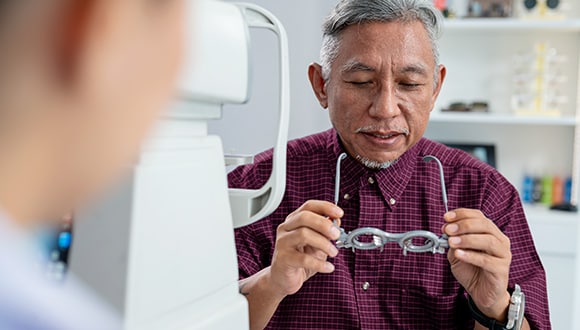How to look after your eye health as you age
Published January 2025 | 5 min read
Expert contributors Whitney Lam, optometry manager at HCF; Professor David Mackey, researcher at Lions Eye Institute
Words by Carrie Hutchinson
Looking after the health of your eyes is an important part of your overall wellbeing. Here’s how to help your eyes stay in good condition for as long as possible.
Sight is considered one of our most important senses. So it comes as no surprise to learn that providing our eyes with the best-possible care is vital at every stage of our life.
“There was a study in 2019 that said people would prefer to have about 4.6 years of perfect health over 10 years of blindness,” says HCF optometry manager Whitney Lam.
And it’s not just our sight that’s impacted by vision impairment and eye disease – our overall quality of life can be affected, too.
“For example, people with dry eyes have a correlation with things like anxiety and depression, and it can significantly affect people socially too,” says Whitney. “It may affect going to parties or other events, and if you’re pulling away, it can also affect your mood.”
Luckily, says Whitney, there are many ways to protect the health of your eyes.

What’s eye health?
There are three ways to measure eye health, says Whitney, and “they all begin with C”.
- Clarity: Clarity of vision refers to the state of your vision, or on a more basic level, how well you can see.
- Comfort: This is how your eyes feel to you. Is there irritation or pain in your eyes on a day-to-day basis? Do you have dry or itchy eyes?
- Condition: This is the state of the eye physically, both externally and internally. This can be hard to work out yourself and is best determined by your optometrist doing a standard eye examination.
Why is eye health important?
According to a study by Sydney’s Brien Holden Foundation, half of the world’s population – about five billion people – will be short-sighted (myopic) by 2050.
Apart from the cost and inconvenience of wearing glasses or contact lenses, there’s an increased risk of blindness due to diseases, like early onset cataracts, retinal detachments, glaucoma, and crossed eyes. Research suggests these are risk factors of myopia, says Professor David Mackey, a researcher at Western Australia’s Lions Eye Institute.
“The major thing to remember with myopia is that the eye is stretching out in length and growing too long, and that can damage parts of the back of the eye,” says Prof Mackey.
You can get retinal detachment, where the retina tears, and that can lead to permanent blindness if it’s not treated early, he adds. There’s also an increased risk of glaucoma, where the optic nerve is damaged, as well as an increased risk of myopic maculopathy, which is where the very back of the eye – the macular region – is damaged.
“That can lead to loss of central vision,” explains Prof Mackey. “In fact, the data coming out now is that myopic maculopathy is becoming the most common cause of blindness in working-age adults.”
The risk factors for myopia
One of the main risk factors for myopia is genetics, but others include environmental and lifestyle factors, like prolonged close-up activities (like reading and screen time) and not enough outdoor time.
“Someone who does a university degree or a doctorate degree is more likely to be short-sighted than someone who just finished high school,” notes Prof Mackey. “Data from the Busselton Health Study in Western Australia showed that the people who spent a lot of time outdoors had almost half the rate of myopia – only 11.9% instead of 21.6%.”
The eye tests you should have
There are several standard eye tests performed at different stages of our life. Babies will usually be checked by a paediatrician at birth and most children will have a test when they start kindergarten.
“A lot of the time, children don't know what normal is or they think that everyone sees the same way as they do,” says Whitney. She says parents need to look for signs of vision issues. “You only find out [if there is a problem] once it is compared to their peers or to your own.”
If your children sit too close to the television or are falling behind at school – an indication they may be having trouble reading or seeing the board – take them to the optometrist. If the optometrist finds myopia, or identifies a high risk of myopia, then there are different myopia control treatments available.
Due to the prevalence of myopia, optometrists now have accreditation to prescribe treatments to not only correct myopia but also to manage its progression.
For young people starting work, especially those in offices, an optometrist can advise on lighting, screen positioning and eye protection for long hours in front of the screen.
Many Australians lose part or all of their sight as a result of diabetes, which increases a person’s chances of developing eye disease. Diabetes occurs when your body loses the ability to produce insulin or stops producing or using it efficiently. This causes blood glucose levels to rise. High blood glucose levels can negatively affect your eyes in several ways. Diabetes can also damage the capillaries in the eye. If they rupture, small bleeds and swelling occur at the back of the eye. The medical name for this is diabetic retinopathy. Australians with diabetes should have regular diabetes eye checks.
Most people who already have myopia will update their glasses regularly. As a matter of course, the optometrist will check for glaucoma, macular degeneration and other eye conditions.
HCF members with eligible extras cover can claim 100% back on a range of prescription glasses or contact lenses*. HCF Eyecare Centres also offer a range of myopia treatments for eligible members.

Tips for looking after your eye health
Eat for your eyes
“Eat your leafy green vegetables and fish,” says Whitney. “We recommend two or three serves of fish a week. For vegetarians or people who don't like fish, plant seed options like flaxseed oil are an alternative.” Contrary to popular opinion, carrots don’t contribute to vision. Although vitamin A in the form of beta-carotene is good for eye health, it doesn’t help you see better at night.
Don’t smoke
This can affect your overall health – not just your eyes. Smoking is a common risk factor in early age-related macular degeneration, which is the leading cause of vision loss in Australians over 50.
Apply the 20/20/20 rule
“For every 20 minutes you spend looking at a screen, take at least a 20-second break and look 20 feet [6m] away – into the distance to the outside is good,” says Whitney. “You can also add 20 intentional blinks to make sure you're refreshing the front surface of the eye as well.”
Spend more time outdoors
“A recent study suggested we probably need to have 2.5 hours outside per day,” says Prof Mackey, who advises making the most of the first three and last three hours of sunlight each day when the UV index is at its lowest. “You can do this by getting kids to walk or ride their bikes to school, doing sports activities before or after school and having an evening meal outside.”
Protect your eyes
“Wearing a hat and sunglasses stops damage to the eye and helps prevent skin cancers around the eye,” says Prof Mackey. These precautions also help prevent pterygiums (a fleshy growth on the eye), cataracts and other sun damage to the eye. You should also wear eye protection when undergoing potentially dangerous activities like welding, working in a laboratory or fishing.
Want to upgrade your glasses?
Prescription glasses shouldn't be a luxury. Get up to 100% back on a range of prescription glasses*. Plus, get free digital retinal imaging with your eye test at any of our More for Eyes providers including HCF Eyecare, Specsavers and Dresden Vision.
Related articles
Do I need glasses?
Squinting? Prone to headaches? Trouble focusing? These are all signs you could be part of a growing majority of Aussies who need glasses.
Guide to macular degeneration
Find out if you’re at risk of being affected by this eye disease, how it’s diagnosed and how you can lower your risk factors.
How to prevent short-sightedness
With short-sightedness on the rise in Australia, we investigate the different ways to manage and help prevent myopia in children and adults.
Eye tests and check-ups
How long does an eye test take and what types of things do they look for? Here’s what you need to know when getting your eyes checked.
IMPORTANT INFORMATION
* Waiting periods and annual limits apply. 100% back available on selected covers for prescription glasses, sunglasses, and contacts, excludes add-ons like high index material, coatings and tinting.
This communication contains information which is copyright to The Hospitals Contribution Fund of Australia Limited (HCF). It should not be copied, disclosed or distributed without the authority of HCF. Except as required by law, HCF does not represent, warrant and/or guarantee that this communication is free from errors, virus, interception or interference. All reasonable efforts have been taken to ensure the accuracy of material contained on this website. It’s not intended that this website be comprehensive or render advice. HCF members should rely on authoritative advice they seek from qualified practitioners in the health and medical fields as the information provided on this website is general information only and may not be suitable to individual circumstances or health needs. Please check with your health professional before making any dietary, medical or other health decisions as a result of reading this website.